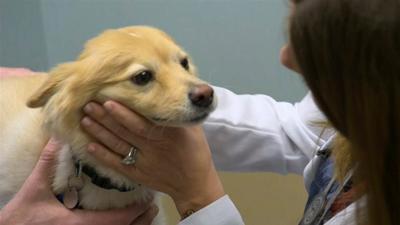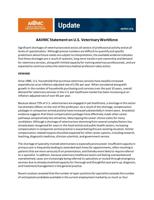PASCO, Wash. - On New Year's Eve, a veterinary clinic closed its doors because it didn't have enough veterinarians to keep up with pets' medical needs. Dr. Dori Borjesson of Washington State University's College of Veterinary Medicine said she's never seen the shortage this bad.
"The mental stress, the compassion fatigue, the burnout," says Dr. Erickson. "And of course the high cost of becoming a veterinarian and the lack of support staff."
"The demand of veterinarian education is very strong," Dr. Borjesson said. "This year we have had 2,400 applicants for 142 slots."
The landscape of veterinarians does not reflect the demand for education. Since 1980, United States households that take their animals to the vet have increased by almost three percent a year, according to the American Association of Veterinary Medical Colleges.
That increase is making it hard for some clinics to keep up.
"We are increasing our class size to educate more veterinarians," Dr. Borjesson said. " We have a pretty deep pool in Washington for people who apply to vet school. We're hoping to increase our number of in-state students."
According to Dr. Borjesson, vet school is expensive, and that's a factor in the shortage. She said vets aren't paid like doctors, and students take longer to pay off student loan debt.
The shortage of vets is also affecting shelters across the state.
The Tri-Cities Animal Shelter is at capacity. Ben Zigan, the Director of the TCAS, said they will only make their animals available for adoption once they are either spayed or neutered.
"When we bring in the strays, we will hold them for 72 hours to give the owner a chance to claim them per the municipal code," he said. "After that, we start scheduling for the spay and neuter."
Zigan said they have a part-time vet who works at the shelter twice a week, but due to the size, they have also been reaching out to vets around the area for help.
"It may not be a week to two to get them in," Zigan said. "So in turn that animal will stay here for two weeks even if it's highly desirable and have multiple adopter waiting."
Zigan said the delay is causing the shelter to ask the community to hold on to an animal until some space opens up.
YAKIMA, WA - Since the COVID-19 pandemic started veterinarian clinics around the state have become extremely overwhelmed with the amount of ne…
Dr. Borjesson said that vet care is not only scarce for household animals, but it's also affecting many other areas of vet care, such as farm animals.

































Commented
Sorry, there are no recent results for popular commented articles.